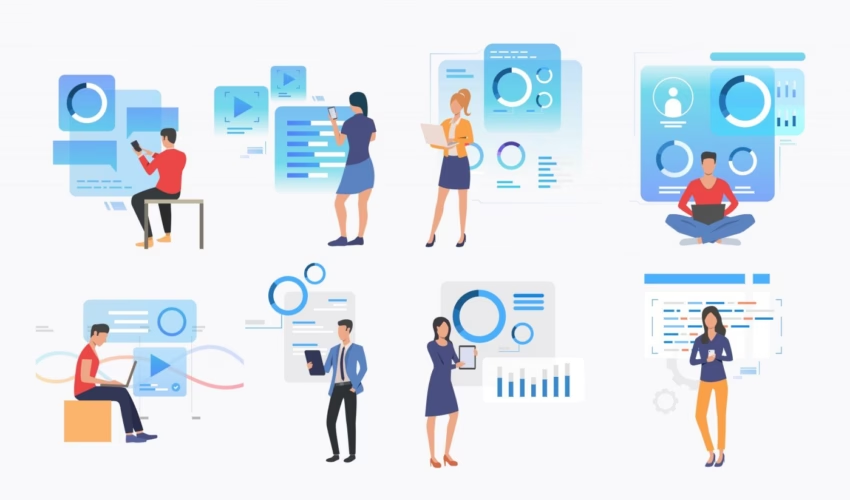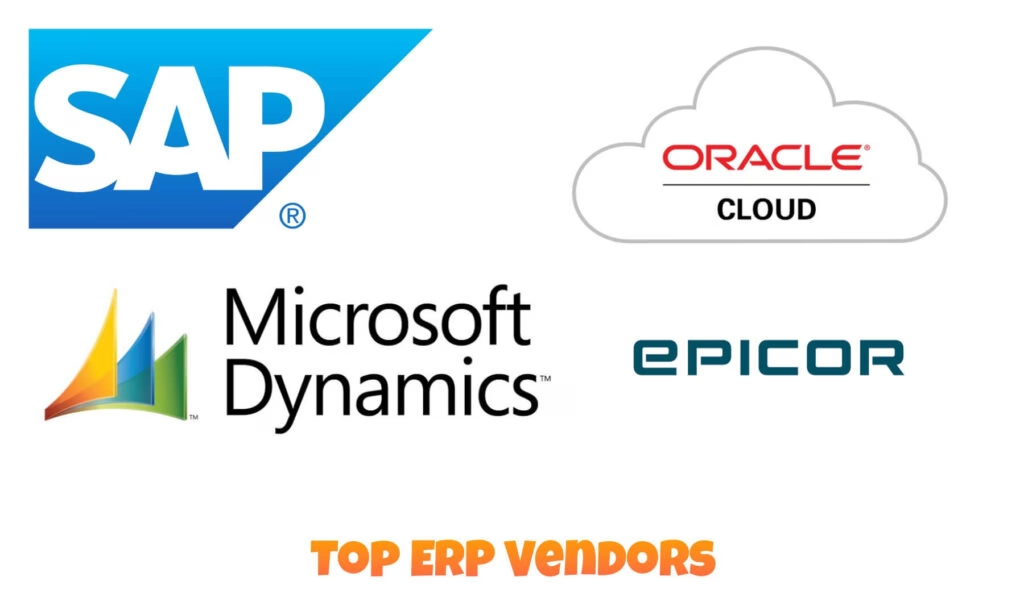
Custom ERP Development: How to Build an ERP System for Your Business
Have you decided to build an ERP system for your business?
Custom ERP development is about building software that fits your business like a glove and enables you to automate all the processes exactly the way you need them. One of the most important advantages is that instead of paying tens or even hundreds of thousands of dollars for Salesforce-based ERP software, you can now build your custom ERP system for a comparable budget and launch the first version in under one year.
And the best part - you decide the modules, you choose the rules of operations. You connect them to the tools your team already uses every day. The result? You get an ERP system that matches how you work instead of forcing you to work around it with legacy ERP system providers like Salesforce or Oracle.
When you own your system, you’re not locked into monthly fees. There are no surprise upgrades or waiting for a vendor to fix what’s broken. You get real control. You get a setup that grows with you. It improves your business processes and actually pays off in the long run.
Now here’s the trap. Most companies start with off-the-shelf ERP software because it seems easier. But those pre-existing ERP systems are built for the average company, not yours. You end up paying for features you’ll never use. That’s not efficiency. That’s a compromise.
If you want an ERP system that works for you, a custom ERP software is the smarter choice from day one.
In this article, I will walk you through everything you need to know. I will discuss how custom ERP systems work, what they include, and how you can build one that works the way your team already does.
In this article:
- What Is Custom ERP Development?
- 7 Key Features of Customized ERP Software Development
- How to Build Your Custom ERP Solutions?
- Benefits of Custom ERP Development
- How to Choose Between Third-Party and Custom ERP Solutions
- Key Factors That Affect Cost for ERP Software Development Services
- Industries Served with Custom ERPs
- Why Work with DevTeamSpace for Your Custom ERP Solutions
What Is Custom ERP Development?
Enterprise Resource Planning (ERP) software is a system that helps you manage and connect your key processes in one place.
According to reports, the global ERP software market was valued at USD 64.83 billion in 2024 and is projected to grow to USD 123.41 billion by 2030. This growing demand shows a shift toward systems that meet specific needs rather than relying only on generic platforms.
Custom ERP software development takes this a step further. With this, you can build a fully personalized ERP system that matches your company's exact business processes, operations, and goals.
Unlike pre-built ERP systems, which are pre-packaged with standard modules and workflows, it is designed from the ground up to show how a specific business works.

Get a complimentary discovery call and a free ballpark estimate for your project
Trusted by 100x of startups and companies like
A custom ERP software serves as a central hub for managing key functions such as:
- Financial management
- Human resource management
- Inventory management
- Customer relationship management (CRM)
- Supply chain management
- Project management
Ready-made ERP software offers a selection of features, but it often includes unnecessary modules. They also have limited customization options and restricted integration with legacy systems. On the other hand, you can gain full control over the ERP modules, system architecture, and functionality with custom ERP system development.
7 Key Features of Customized ERP Software Development
Making a new ERP system from scratch will address the exact needs of your business. Unlike pre-built ERP software that delivers fixed modules, ERP customization allows your company to fit every feature based on your own internal structure, team responsibilities, and growth plans.

1. Modular Architecture
Custom ERP systems are structured with modular components. Each function is designed as a separate unit. You can choose to develop only the modules currently needed and add others later as your business operations grow.
This modular structure supports:
- Efficient ERP development
- Easier updates and maintenance
- Reduced system complexity
- Long-term flexibility across departments
2. Workflow Automation
One of the key reasons for investing in custom ERP software development is the ability to automate routine tasks. Your approval chains, order processing, task assignment, and alerts can be customized to reduce human error. It also improves both speed and consistency across the entire ERP platform.
Automation also leads to faster decision-making by giving managers timely access to accurate data. You'll be able to lower the workload on staff and keep internal processes matched with company policies.
3. Advanced Reporting and Analytics
A custom solution provides full control over data analytics and reports. You can define role-based dashboards, custom KPIs, and real-time metrics. Integrating advanced analytics helps track both operational and strategic performance across all departments.
Some of its features include:
- Department-specific reports
- Real-time data visualization
- Forecasting and predictive analytics
- Export tools and report schedulers
4. Integration with Existing Systems
Developing an ERP system builds a seamless integration with existing systems. This includes legacy software, databases, or third-party tools such as CRM software, payroll solutions, or warehouse management systems.
Moreover, integration is not limited to surface-level connections with complex systems. It involves detailed API development, data mapping, and system alignment. So, you can keep information flowing across departments without delays or duplication.
With a customized ERP, you don’t have to juggle separate, disconnected systems. Proper integration ensures smooth data flow, improves coordination across teams, and keeps all departments aligned through centralized data management.
5. User-Friendly Interface and Role Management
A custom ERP system is designed with a focus on usability. Interfaces are built based on actual user feedback. You also make it easier for teams to learn and adopt the system. Role-based access also guarantees that employees only interact with the functions relevant to their job.
Common features of custom ERP interfaces include:
- Clean, intuitive interfaces
- Custom dashboards per department
- Admin-level access control
- Audit trails and activity logs
6. Scalability and Long-Term Adaptability
A custom ERP can grow and adapt as your business evolves. For example, you can add new modules to manage inventory in additional warehouses, integrate e-commerce platforms as your online sales grow, or implement advanced analytics for better decision-making. You can also add more users or expand the system to new departments or locations without affecting performance.
Custom ERP systems can adapt to technological and regulatory changes as well. For instance, you can enable mobile access for field teams, migrate to cloud-based ERP solutions, or update processes to comply with new industry regulations, all without needing a full system overhaul.
This flexibility ensures your ERP continues to support your operations efficiently over the long term.
7. Security, Data Integrity, and Encryption
A major focus in custom ERP software development is maintaining data safety. This is especially important for industries such as healthcare, insurance, real estate, and manufacturing.
Custom ERP software allows your business to define its own security policies. This includes data encryption, user permissions, and backup schedules.
Your custom software should include features, such as:
- Encrypted data storage and transfer
- Secure login and multi-factor authentication
- Scheduled data backups and disaster recovery
- Compliance with local and global data laws
How to Build Your Custom ERP Solutions?
Building a custom ERP system requires technical planning combined with an understanding of real business needs. A reliable ERP software development process includes a series of steps that focus on planning, development, testing, and deployment.

1. Build Your ERP Development Team
Start by forming a capable ERP system development project team. This should include an ERP project manager, an ERP specialist, and senior managers from departments that will use the system.
You’ll also need skilled:
- ERP developers for customizations
- Data analysts for preparing and migrating data
- QA engineers for thorough system testing
Bringing together expertise from both technical and operational sides keeps the ERP system designed to meet your business needs.
At DevTeam.Space, we streamline this process by providing a full team of experienced ERP developers, data analysts, QA engineers, and project managers, so you have all the expertise you need in one place.
2. Define the ERP Development Scope
Once the team is in place, the next step is defining the ERP implementation scope. Conduct a business requirements analysis to identify existing system limitations and align your new custom ERP features with business goals. You should consider the risks, costs, and your team’s readiness for change at this stage.
You can use AI-powered support tools to help speed up ideation, planning, and feature validation. These tools can assist with ERP scoping, MVP definition, and system logic to help you explore the structure and features before investing in full custom development.
3. Migrate Your Data
It is also important to plan and execute a clean, accurate data migration from your current systems if needed. You need to remove duplicates, standardize formats, and check that only relevant information is transferred.
You can use vendor-provided tools or managed cloud migration services to maintain data integrity and reduce downtime.
4. Test the Custom ERP System
After configuration and migration, run comprehensive tests to confirm stability, ERP's functionality, and performance. You can include:
1,200 top developers
us since 2016
- Unit tests
- Integration tests
- User acceptance tests
This will keep the system working as intended before going live.
5. Train Your Teams
Develop user training materials and sessions to help employees understand and effectively use the new ERP tools. Involve IT staff in technical training so they can address issues and maintain the system over time.
6. Deploy the ERP Software
Roll out the ERP system in phases to minimize disruptions. You can start with high-priority modules before proceeding to low-priority ones. You should also verify hardware compatibility, run operational tests with live data, and confirm that user permissions, reporting, and workflows operate smoothly.
7. Monitor and Maintain
ERP implementation is an ongoing process. Monitor system performance, track KPIs such as process efficiency and customer satisfaction, and schedule regular updates. Continuous evaluation ensures your ERP solution grows with your business needs.
Benefits of Custom ERP Development
Custom ERP software offers many advantages over generic platforms. It addresses unique business challenges, replaces disconnected tools, and organizes data to better support your operations. In this section, we’ll explore the key benefits of implementing a tailored ERP system.

Increased Process Accuracy for Human Resource Management
Custom ERP software reduces miscommunication. Every task and process becomes a part of a connected system. From tracking raw materials in supply chain management to handling approvals in project management, each action is logged, time-stamped, and traceable.
Your teams spend less time checking requests or updating outdated records. Errors from manual input are reduced, and every department has access to the same live data. This allows for stronger internal alignment and fewer delays in your business.
Purpose-Built Customer Relationship Management
Off-the-shelf CRM software often includes too many fields, menus, or steps. These might not reflect how your business actually handles leads and clients.
A custom-built CRM module inside the ERP system is designed to match how sales, support, and marketing teams work.
This includes:
- Custom contact pipelines
- Personalized follow-up triggers
- Automated reminders based on the company’s real timelines
When CRM is part of the ERP system, customer data is no longer isolated. It becomes a part of your process.
Data-Driven Decision Making at Every Level
Custom ERP solutions include data analysis tools that align with company-specific metrics. Your teams need not rely on generic dashboards. Leadership teams also gain access to accurate, live insights without needing to export spreadsheets or build external reports.
Forecasts, inventory usage trends, cash flow tracking, and productivity data are all reviewed in one place. This supports faster and more confident decisions. It is also necessary when responding to market changes, supplier issues, or customer behavior shifts.
Reduced Dependence on External Software
Customized ERP solutions help you avoid relying on separate tools or paid subscriptions. Common business functions can be built directly into the ERP system.
This includes:
- Expense tracking
- Shift scheduling
- Time-off approvals
- Vendor management
You no longer need to manage logins, subscription renewals, and disconnected data sources. It also makes security and compliance easier to manage. All your activity is logged within the same secure environment.
Easier Adaptation to Regulatory or Industry Changes
There are industries affected by new regulations or reporting requirements. A custom ERP platform will allow you to respond quickly. You can update internal rules, adjust reports, or add approval steps.
You remain productive even as rules change. This makes it easier to stay compliant without needing outside ERP vendors to release updates.
Lower Long-Term Operating Costs
Custom ERP systems often involve higher initial development costs. However, they avoid recurring expenses tied to licensed cloud platforms. There are no per-user charges, upgrade fees, or forced renewals.
These savings grow as the system continues to support teams and handle larger data. Maintenance can also be handled in-house or through an ERP development services partner.
How to Choose Between Third-Party and Custom ERP Solutions
Choosing the right type of ERP software depends on how your business operates.
What do you need to manage? How much control do you want over your system?
Third-party ERP solutions and custom ERP solutions have their specific uses and limitations.
When to Consider Third-Party ERP Software

Third-party ERP systems are prebuilt and designed to support common business functions out of the box. They are often a good fit for businesses that:
- Need a quick deployment timeline
- Operate with simple or standard workflows
- Have a limited IT budget or team
- Want vendor support and regular updates
- Can adapt internal processes to match system defaults
Third-party ERP solutions can reduce the time it takes to go live. They are also generally easier to implement. However, features that aren't needed can be included. You may also find a lack of flexibility with specific processes or compliance needs.
When Customized ERP Application Development Is the Right Choice
Custom ERP solutions are a better option when you need total control over your ERP system. If you're looking for a competitive advantage, you need custom software for workflows that are not manageable by generic tools.
We recommend custom ERP software development if you:
- Operate in highly regulated industries
- Have specific approval flows or reporting requirements
- Need to integrate with legacy platforms
- Are growing rapidly and need a flexible system
- Want full ownership of software and data management policies
- Plan to automate recurring tasks that off-the-shelf tools can't support
Building a custom ERP takes more time and higher initial investments. On the other hand, you will be given unmatched flexibility, security, and scalability. You can choose the exact ERP modules you need and expand the system as your operations grow.
At DevTeam.Space, this is exactly what we offer: a full-service team of pre-vetted ERP developers who can design and build an ERP system from scratch, as well as tailor it to your business needs.
Key Factors That Affect Cost for ERP Software Development Services
Investing in a custom ERP system is a major decision. Custom ERP software development can go from $18,000 for small projects with limited modules. For enterprise-grade systems, it can even go up to $500,000 or more with the ERP's functionality.
However, the cost of your ERP system will depend on several variables. You need to consider how many modules are needed. You also need to know how secure the system must be and how much support is expected.
Number of Modules
The number of ERP modules included in the build directly affects cost. Each module requires its own logic, data structure, and interface. As more modules are added, your development time and testing requirements increase.
For example, adding a custom CRM module means building lead tracking. You also need to check on follow-up automations and communication history tools. These require close collaboration between your ERP programmers and stakeholders to maintain accuracy.
Integration Needs
Connecting a custom ERP system to other platforms adds another challenge to the development process. These integrations involve:
- Building or adapting APIs
- Mapping data fields
- Keeping seamless integration between systems
Well-executed integration reduces double entry and improves overall data management. However, it also increases scope. Every tool added to the integration plan must be analyzed for compatibility, speed, and long-term support.
Customization Depth
The level of customization needed also plays a role in pricing. Some companies only need standard input forms and basic reports. Others require highly specific workflows that match their business operations. The deeper your customization is, the more time is needed.
Dashboards, automated approval processes, or user-specific role views also increase your development work. These details are important for system usability, but will come at a higher build cost.
Security Requirements
Companies with strict privacy or compliance standards often need advanced security features. This includes:
- Data protection
- User permission controls
- Audit trails
- Backup systems
Security design is a top priority in industries like finance, healthcare, and logistics. These are industries where access control and traceability are not optional. Building strong security measures into the system from the start improves risk management. However, it also raises the overall cost.
Support Model
After launch, your custom ERP platform will still need updates, bug fixes, and user support. These services add to the total cost of ownership. Most businesses allocate around 15–20% of the original development budget per year for maintenance.
Industries Served with Custom ERPs
Custom ERPs are used in different industries to manage data in one place. Each industry uses ERP systems differently based on its specific needs, workflows, or regulations.
Manufacturing
In manufacturing, an ERP system becomes the source for managing production and business performance. Teams can monitor supply levels or track the status of active orders. Outputs can remain consistent without using multiple disconnected tools.
Construction
Construction ERP software development provides a centralized space for:
- Budget oversight
- Project timelines
- Progress tracking
Project managers use it to compare actual costs against estimates. They can also check the use of labor and materials. At the same time, they are able to respond to delays before they cause setbacks.
Retail and E-Commerce
Retail ERP systems connect sales data with inventory counts and customer profiles.
Stock updates happen automatically as sales are made to avoid overselling. Online ordering connects directly to inventory management. This gives customers accurate availability and delivery information on orders.
Healthcare
Hospitals and other healthcare providers depend on ERP platforms to coordinate patient care. Its role-based access and data protection also maintain security for medical records.
Data can also be made available to authorized staff when needed. At the same time, appointment scheduling, billing, and resource allocation all work within the same system.
Agriculture
ERP solutions in agriculture simplify crop planning, field monitoring, and logistics management.
Farmers can review their planting schedules. They can also track equipment performance or coordinate their delivery times. These are all done without switching between separate systems.
Insurance and Financial Services
In insurance, ERP software development stores policy details, claim records, and compliance reports in one location. Integrated financial management features make it easier to:
- Process payments
- Produce accurate reports
- Meet regulatory deadlines
Real Estate
Real estate ERP systems manage information, such as:
- Property data
- Lease agreements
- Tenant information
- Maintenance requests
Different teams can work with the same up-to-date records. It reduces errors and shortens transaction timelines.
Why Work with DevTeam.Space for Your Custom ERP Solutions
At DevTeam.Space, we deliver high-performance, scalable, and business-focused custom ERP development solutions for companies that need more than a one-size-fits-all system. With a project success rate above 99%, our track record speaks for itself.
Our vetted community includes expert development teams and senior software developers, supported by our proprietary AI-powered agile process. Every ERP engineer in our network is carefully selected. They go through an invite-only process and receive continuous training to stay ahead.
Our ERP solutions are not only built to solve today’s problems; they’re designed to grow. With support from our dedicated business analysts and tech account managers, we introduce our clients to the best tech stack for designing ERP platforms that are easy to upgrade and scale over time.
This is one reason why most of our clients choose to continue working with our ERP software development company for ongoing support, feature expansions, and performance maintenance.
When you choose DevTeam.Space, you're gaining more than a development vendor. You're gaining a partner that delivers secure, stable, and business-aligned custom ERP software that fits your goals, budget, and timeline.
If you're ready to build or upgrade your custom ERP system, we’re here to help you succeed. Fill out our request form (risk-free!), and we will be in touch to see how we can help!


